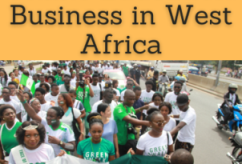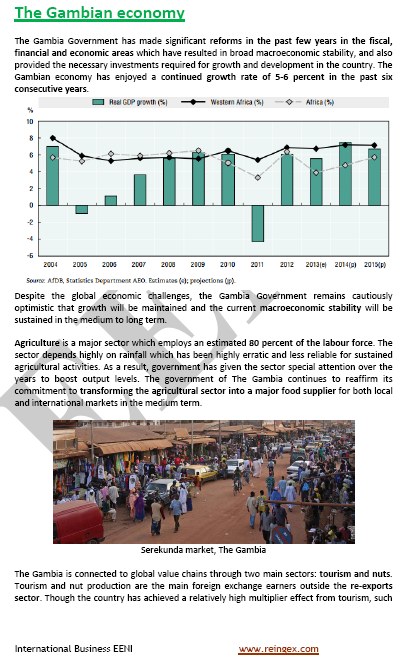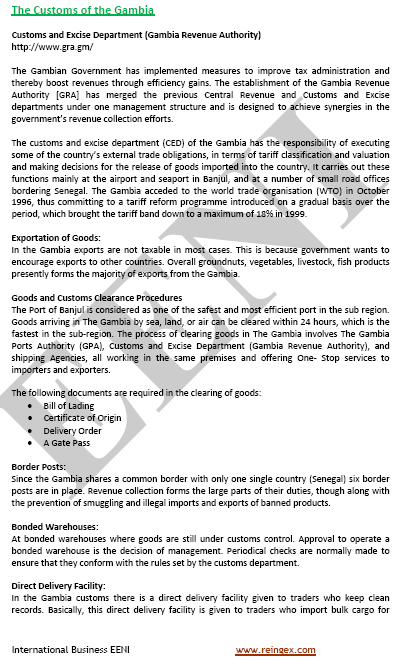Business in the Gambia, Gambian Economy

Gambia (Foreign Trade): agricultural export-oriented country, Banjul, Serrekunda
- Introduction to the Republic of the Gambia (West Africa)
- Business in Banjul
- Gambian Economy
- International Trade of the Gambia
- Business and Investment Opportunities in the Gambia
- Air Transport Services
- Energy
- Agribusiness and fisheries
- ICT
- Light Manufacturing
- River Transport
- Tourism
- Case Study: business opportunities in the Gambian agriculture sector
- Access to the Gambian Market
- Business Plan for the Gambia
The objectives of the subject “International Trade and Business in the Gambia” are the following:
- To analyze the Gambian Economy and Global Trade
- To know the trade opportunities in the Gambia
- To explore the Gambian trade relations with the country of the student
- To know the Gambian Trade Agreements
- To develop a business plan for the Gambian Market

The Subject “Foreign Trade and Business in the Gambia” belongs to the following Online Programs taught by EENI Global Business School:
Doctorate in African Business, World Trade.

Master in Business in Africa, International Business, Foreign Trade.


EENI Partnerships with Educational Institutions
Languages:  or
or  Gambie
Gambie  Gambia
Gambia  Gambia.
Gambia.
- Credits of the subject “Doing Business in The Gambia”: 1

- Duration: one week
Masters adapted to  Gambian Students.
Gambian Students.

International Trade and Business in the Gambia.
The Republic of the Gambia: an agricultural export-oriented country.

- Access to the Port of Dakar
- Dakar-Gambia-Lagos Corridor


Gambian Preferential Access and Trade Agreements:

- WTO
- GATS
- Agreement on Sanitary Measures
- Agreement on Technical Barriers to Trade
- Agreement on Preshipment Inspection
- Agreement on Safeguards
- Trade Facilitation Agreement
- WCO
- Hamburg Rules
- BIC (Containers)
- Chicago Convention (ICAO)
- International Maritime Organization
- Istanbul Convention
- ECOWAS Regional Road Transport and Transit Facilitation Programme
- Customs Convention on Containers - not a member

- Economic Commission for Africa
- African Union
- AUDA-NEPAD
- African Union Convention on Preventing and Combating Corruption
- Africa Agriculture Development Programme
- African Development Bank
- Africa-Asia Partnership
- Africa-Korea Partnership
- China-Africa Cooperation
- Africa-India Cooperation
- Africa-Japan Cooperation
- Africa-South America Summit
- Africa-BRICS
- Africa-Turkey Partnership

- Afro-Arab Cooperation
- BADEA
- Islamic Development Bank
- OIC

- UN
- UNCTAD
- ITC
- WIPO
- WB
- WTO
- IMF
- ...
- Area of The Gambia: 11,365 km²
- Gambian population: 1.75 million (40% of the population between 0-14, 40% of the Gambian population is literate)
- Borders of The Gambia: Senegal
- Capital of The Gambia: City of Banjul
- Largest Gambian city: Serrekunda
- Official language of The Gambia: English and different Gambian languages (Mandinka, Wollof, Fula, Jola)
- Currency of The Gambia: Dalasi
- Independence of The Gambia from the UK: 1965
More information: The Gambia (EENI African Business Portal).
Main Religions in The Gambia:
- Islam (90% of The Gambian Population)
- African Traditional Religions
- Christianity (8%)

Gambia belongs to the West African Economic Area.
The Gambian Economy:
- The Gambia is a Market-based Economy
- Continued growth rate of 5-6% in the past six years
- Gambian services sector: 58% of the Gambian GDP
- Fasting Gambian growing sector: tourism (16% of the GDP)
- Gambian agricultural sector: 22% of the GDP.
- 80% of the labour force
- Vision of the Government: “to become an export-oriented agricultural country”
- Gambian Inflation: 5.7%
- Top Gambian export markets: the EU, China, and India
- Top export products: peanuts, fish, cotton, and palm kernels
- Top exporter countries to the Gambia: China, Senegal, Brazil, the UK, India, and Indonesia
- FDI stock in the Gambia: 675 million dollars
- Main Gambian port: Port of Banjul
- Export promotion and Zone Investor Incentives. Tax Holiday
- Mobile operators in the Gambia: Africell, Comium, Gamcel, and Qcel
Sample - Foreign Trade and Business in the Gambia:

Sample - Customs of the Gambia:

(c) EENI Global Business School (1995-2024)
We do not use cookies
Top of this page


